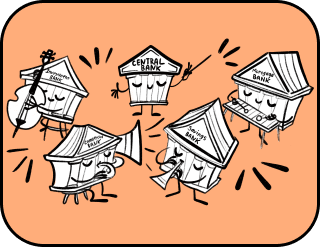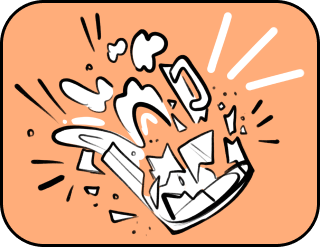Déjà vu: a game of your subconscious mind
You’ve chosen the «full immersion» mode. Welcome to the game.
Cutscene 1: Life Mission
A familiar melody of the alarm clock, cereals for breakfast and contrast shower,
30 minutes in a loathsome subway train,
the 1900th entry into the office building,
the 10th trip to the WC under a grim gaze of the Boss
The character finds himself at the doorstep of his first mission in the game called “Déjà vu”.
The goal of the game is to accomplish all the primitive actions, not go insane and find out what lies behind the feeling of the “already seen”.
Level 1: This is still me
The space bar, F9 key, one movement of the mouse – and the character heads to the kitchen, where every step is cyclical and immaculately polished. Every sound and every smell seem oddly familiar, repetitive to the hero. As though he has already been on the first level before, but when?
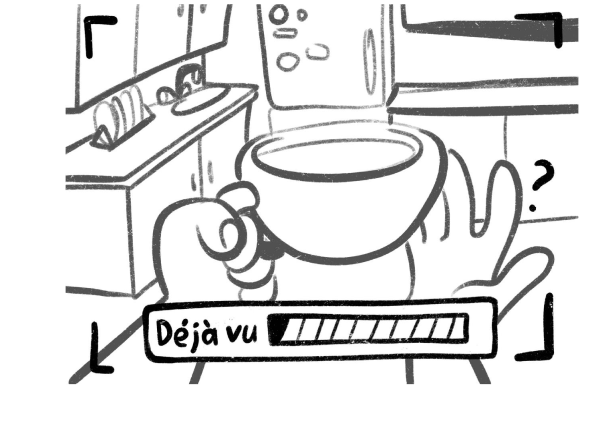
Déjà vu is not just an illusion of recognition. At the end of the 19th century, the French psychologist Émile Boirac gave this phenomenon its proper name, describing it as “already seen”. Apart from the term “déjà vu”, signifying “already seen”, there are some terms, which are less spread, but quite similar:
Déjà fait translates as “already done” that refers to a feeling that a person has already performed this very action despite the fact it is happening for the first time.
Déjà vécu means “already experienced” and describes a deeper sense, when you not only see, but also completely go through some particular moment as if it has already taken place one day, including all the emotions and physical sensations as well.
Besides, there is the opposite, the reverse side of the déjà vu — the so-called jamais vu, when known things are perceived as absolutely new and unaccustomed. This effect is more uncommon, but is still of great interest to study.
On the first level the character is wondering about déjà vu being connected to the disruption of the brain. Since the brain sometimes can’t correlate the information from our short-term and long-term memory, it creates the illusion that some current event has already occurred.
Cutscene 2: Track to the office
The character keeps feeling a strange déjà vu:
A familiar song on the radio,
Buildings outside the window,
Random bystanders…
It all seems to be a recurrence of something that has already happened to our character once. Maybe in his past life. But his own mind and his playing characteristics give a hint that it is not possible.
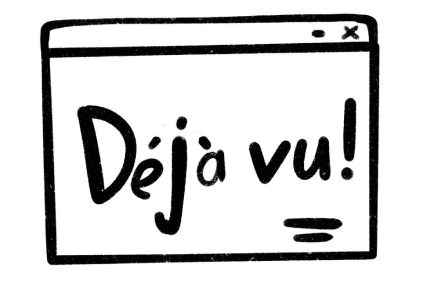
Level 2: This is already another me
The character enters the office “Déjà vu Corporation”, and all proceeding around him is repeating with horrifying precision. On the second level the game acquires the guardian whose mission is simple – not let pass through. The character is not acquainted with the guardian, but surprisingly knows his name. Pressing F12 opens to the character some new horizons: he is using his ultimate ability, calling the guard by his name and pretending to be the Boss. The guardian opens the door with a smile and wishes a «Boss» a good day. And now, still feeling déjà vu, the character is experiencing a thrilling sensation as if he could predict some subsequent developments.
However, this is nothing more than an illusion. Scientists from the University of Colorado, USA, discovered that the déjà vu phenomenon can be accompanied by deceitful prediction of the future, because our brain provides the illusion that a person can be aware of what is going to happen next.

These prophetical feelings are associated with our «meta-memory»: in reality a person can’t remember specific events, but his brain activates some familiar neural circuits, creating an illusion of repetition. When a person faces déjà vu, the brain enhances the same parts of the cortex as when recalling memories. But the problem is that our brain confuses new information with familiar information from time to time. It occurs because the brain tries hard to process the data as quickly as possible using its inventory – the previous memories. Even if a current event is totally new, some pieces of it can easily remind something from the past: a familiar sound, scent or spot. It is like at this instant our brain realises: “I’ve already seen it somewhere!” although, in fact, it is just an illusion.
Meta-memory is a mechanism that helps our brain feel as if something has already happened before, and instead of an accurate memory it uses known fragments, generating a sensation of some situation being replicated.
Cutscene 3: Conversation with the Boss
What was it?
A random glitch of the work of memory?
Fatigue? Stress?
How could he know in advance how the Boss was going to act?
Level 3: And where am I out here?
On the third level our character decides to figure out what is happening in his brain. He navigates up above this level and finds out that déjà vu may be linked to the hippocampus – the part of our brain that is responsible for memory and spatial orientation. Periodically, the connection between the neocortex of the brain and the hippocampus is disrupted and it results in crashes during the proceeding of new information. Particularly often it happens when a person experiences a severe exhaustion or overwork.
With the evolution of the psychoanalysis at the beginning of the 20th, Sigmund Freud and his successors came up with a more psychological interpreting of déjà vu. Freud supposed that this phenomenon is connected to suppressed memories or desires which return to the surface of the consciousness through déjà vu. Unlike some mystical points of view, Freud tried to explain déjà vu through the work of subconscious, where the real experience is mixed-up with dreams and fantasies.

Déjà vu can probably be not only a usual glitch of the brain, it might also refer to some certain pathologies. For example, if people are suffering from temporal lobe epilepsy, déjà vu can arise just before an epileptic seizure. The temporal lobe of the brain is in charge of memory, emotions and perception of reality, so when uncontrolled activity appears in this area (which is typical for epilepsy), a person can experience some false senses as déjà vu. For people with pathologies the déjà vu effect may serve as a precursor of an epileptic fit when neurons start chaotically interacting, violating normal perception.
Similar things can happen to people with schizophrenia, when the disruption of the brain’s work influences the capability of distinguishing real and made-up memories. In this case déjà vu has an episodic nature and may be followed by other symptoms such as anxiety, paranoia and derealisation.
But wait… the character of the game did not suffer from any of these diseases at any of the levels, so the mission is not complete. Let’s dig deeper!
Cutscene 4: Late-night musing
And what if déjà vu is not just a brain’s failure?
What if it is the door to another universe or the print of memories from the past life?
Level 4: Or maybe I am not me anymore?
In the next level our character immerses into unfamiliar stories, into enigmatic researches of déjà vu. The explorers of the past associated the feeling of “already seen” with the past lives or reincarnation. Across cultures and traditions this phenomenon was construed as a mysterious effect that can be connected to reincarnation, memories from the past lives and even parallel realities.

In Medieval Times people often related déjà vu to mystical forces or prophecies. It was believed that déjà vu could be an omen from the Gods or spirits transmitting a significant message. Nevertheless, this kind of phenomena provoked fear, and in those days déjà vu could be regarded as contact with the Devil. Those who confessed to having such «episodes» risked being accused of witchcraft.
In Ancient Greece and in the Roman Empire some philosophers considered this sudden unexpected feeling of “already seen” a memory of the past lives and linked it to the theory of the transmigration of souls. Plato, for instance, in his works examined the idea that the soul had already had its past experience that could partially emerge in consciousness.
In the ancient Eastern philosophical teachings, such as Buddhism and Hinduism, déjà vu was often connected to reincarnation. People thought that our soul reincarnates several times and déjà vu presents this very short-term moment when a person encounters some events, places or people who he has already interacted with in his previous life. It explains the sensation of “recognition” of unfamiliar objects or situations.
Carl Gustav Jung, one of the founders of analytical psychology, fundamentally believed in reincarnation. He claimed that déjà vu is not just a crash of the brain, but a bundle of memories of our earlier lives. Remembering one of his memories, Jung revealed that as a child he had seen the picture demonstrating a man of the 18th century and had recognized himself in that man. According to his opinion, it was the footprint of his previous incarnation – a doctor in the 17th century.
But the main mystical theory says that déjà vu is not a brain’s failure – it is a gateway into parallel worlds. This idea is based on the hypothesis of Multiple Universes, where there can be a tremendous number of reality versions existing simultaneously with our one. Under this theory, déjà vu is the moment when two realities run into each other and a person feels another flow of events processing in a parallel Universe. At this point of time two pieces of experience coincide, triggering the effect of something «already seen».
Certain celebrities (such as Madonna and Tina Turner) also shared their experience of déjà vu, connected to the places where they allegedly lived in their previous incarnations. Madonna stated that her déjà vu happened when she had been in Beijing’s Forbidden City, and Tina Turner had a bright déjà vu flash in Egypt.
Final cutscene: Unlocking
The character realises that déjà vu is a complex phenomenon that can be caused by both biological failures in our brain’s activity and mystical theories of reincarnation.
So can déjà vu be a real glitch in the system or this effect is just a mark of our enacted imagination, intertwining with the outer reality?
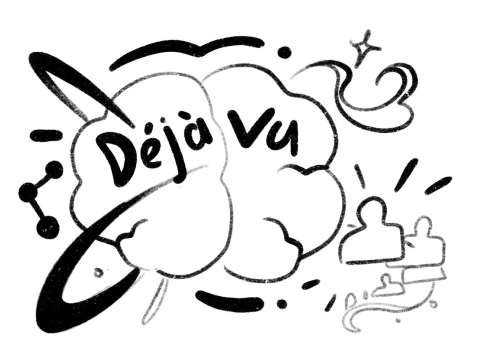
The end of the game: I am me after all
The character got through all the levels, but the mystery of “déjà vu” still remains unsolved. Every time, when our character will experience the feeling of «already seen», he will move back to different levels over and over again, discover how the brain works and observe reality interlacing with memories.
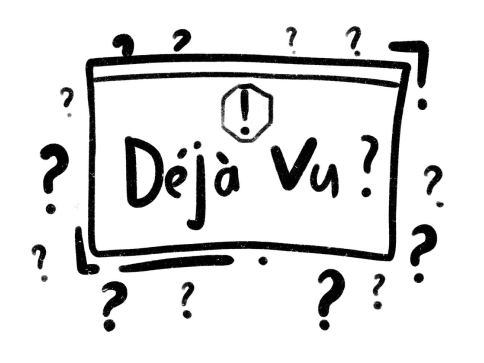
DLC expansion-packs: The events of the add-on start in a couple of days after the final of the original game
Just an interesting fact: déjà vu is more often experienced by young people at the age between 15 and 25. After this point of age this phenomenon occurs less frequently to, ultimately, almost disappear in the elderly. It can be explained by the fact that as we grow older our brain «calms down» and ceases to play with our memories.
The French professor Chris Moulin also studies this effect, experimenting with hypnosis and causing volunteers this very feeling. Moulin describes déjà vu as a «glitch in the matrix», comparing the work of the brain with a supercomputer processing thousands of signals in a second. Sometimes while processing the past our brain begins to unravel, so that a person feels déjà vu.
Additional materials to the original game
A pretty rare add-on that surpassed the original
Fun-fact about music and déjà vu: when you hear a familiar melody, it can be not a memory of the past, but a cover-version or a result of using elements from older songs. Some modern tracks usually borrow melodies and beats, causing listeners a déjà vu feeling.

The déjà vu phenomenon is often used in the cinema, especially in such iconic movies as «The Matrix». The main character called Neo experiences déjà vu as a sign that there is something wrong with a system. This technique became so popular, that déjà vu is now inextricably linked with the idea of a failure in the reality, insinuating that our life can be a simulation. Over the years this supposition transformed into a joke: when someone is experiencing déjà vu, the true connoisseurs of cinema say that the system reboots or there has been a glitch in the matrix.
People who travel a lot and have a multidimensional background feel a sense of déjà vu much more often. It can relate to the fact that they face new cultures and sites which remind them of their previous experience. This phenomenon bears the name of the «effect of a traveler».
While living organisms undergo translocation, deletion, and duplication, we offer scientific knowledge without mutations – only useful discoveries and theories.
Thank you!



